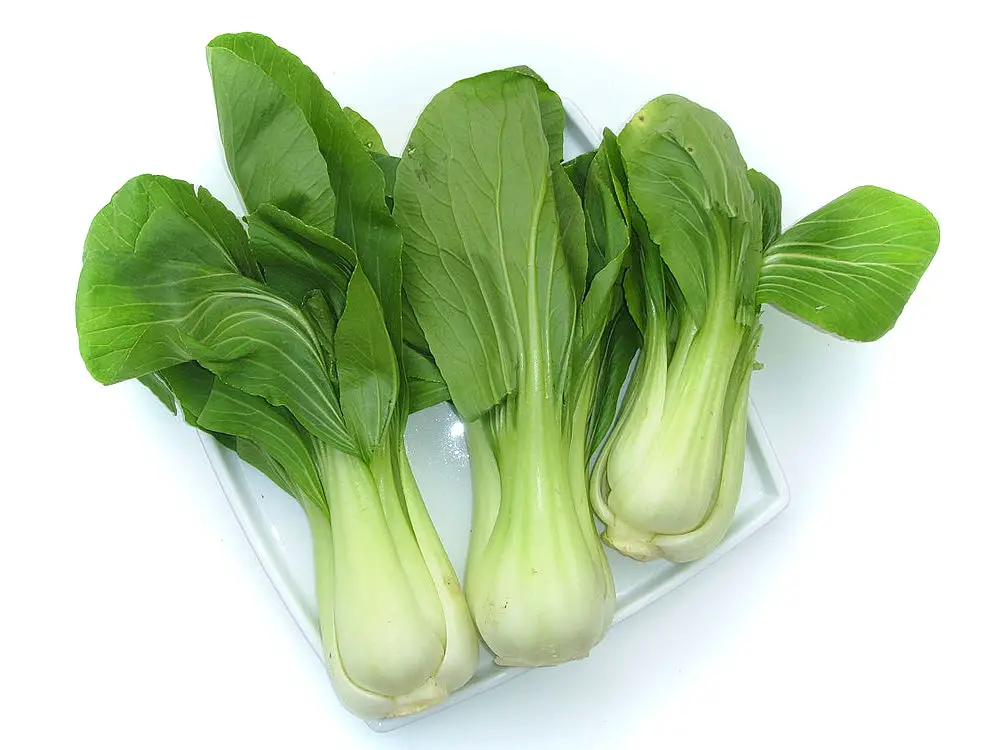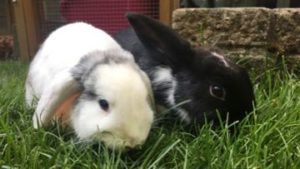Over the last few decades, food tastes in Britain have become more adventurous, and more international. So the other day we found ourselves cooking pak choi (cut in half lengthways, quickly fry, add a splash of water to the pan, cover and cook for a couple more minutes – lovely). For those unfamiliar, pak choi is a type of chinese cabbage, and is common in Asia and Australasia (and also known as bok choy or pok choi). But we had more than we needed. So my partner asked – ‘can our rabbits eat pak choi’? If you’re in a similar position, here’s the answer, with a quick summary followed by more detailed information.
Can rabbits eat pak choi (bok choy) safely?
Rabbits can eat pak choi (bok choy) safely as part of a varied diet based mainly on hay and water. A suitable portion of pak choi for an adult rabbit is about a handful. Bunnies can eat both the green leafy part and the crunchier base of pak choi safely. Pak choi provides helfpul nutrients for rabbits, in particular vitamin A, magnesium and potassium.
Pak choi (bok choy) nutrition and rabbit requirements
| Ingredient | Pak choi per 100g | Rabbit daily nutritional requirements per 100g of feed | Comments |
|---|---|---|---|
| Water | 95.3 g | Most of pak choi is water. This is fine – bunnies need water, and get it through either their food or their water bowl. But the high water content means that it’s not the main food that rabbits should be getting. | |
| Energy | 13 kcal | Pak choi doesn’t provide much energy for rabbits. This is another reason why pak choi should be a supplement for a main diet of hay for rabbits, rather than their only or main food. | |
| Protein | 1.5 g | 12-17 g | Pak choi is low in protein. As rabbits need more protein, this is yet another reason why the main food for rabbits should be hay, with pak choi as an additional item. |
| Fat | 0.2 g | 2.5-5 g | Pak choi is low in fat, which is good as bunnies thrive on a low fat diet. |
| Fibre | 1 g | 14-25 g | Rabbits need a lot of fibre in their diets to keep food moving through their digestive system. Without fibre, it all blocks up and creates problems. Pak choi doesn’t provide enough fibre. Rabbits need hay, which is high in fibre, with some greens like pak choi as additions. |
| Carbohydrates | 2.18 g | < 20 g | Rabbits need a relatively low carbohydrate diet. Pak choi is low in carbohydrates. |
| Calcium | 105 mg | 500 mg | Rabbits need a low calcium diet, as they are prone to developing extremely painful kidney stones. Pak choi is lower in calcium than Timothy hay, their main food source, so it is fine. |
| Iron | 0.8 mg | 30-400 mg | Pak choi only provide a little of the iron that rabbits need in their diets. |
| Magnesium | 19 mg | 30-300mg | Pak choi provides good levels of magnesium for rabbits. |
| Phosphorus | 37 mg | 400 mg | Pak choi only provides a little of the phosphorus needed by rabbits. |
| Potassium | 252 mg | 6,000 mg | Pak choi can contribute a little to the potassium that rabbits need each day. |
| Vitamin A | 4,479 IU | 1,000-1,200 IU | Pak choi is great for vitamin A, which rabbits need. |
| Vitamin C | 45 mg | None | Rabbits don’t need vitamin C (their bodies make vitamin C). The vitamin C in pak choi won’t harm them, but it won’t help them either. |
| Vitamin E | 0.09 mg | 5-16 mg | Pak choi doesn’t provide much vitamin E for rabbits. |
| Vitamin D | None | 80-100 IU | Pak choi provides none of the vitamin D that rabbits need. |
| Vitamin B complex | 0.96 mg | None | Pak choi doesn’t provide much vitamin B, but in any case rabbits don’t need vitamin B complex. Their bodies make all that they need. |
| Zinc | 0.19 mg | 5-15 mg | Pak choi doesn’t provide much zinc. |
| Selenium | 0.0005 mg | 0.005-0.032 mg | Pak choi provides just a little of the selenium that bunnies need. |
As the information in the table shows, the main benefits of pak choi are some of the nutrients it can provide, in particular vitamin A, magnesium and potassium.
The information also shows why it is good to provide your bunny with a varied diet. Other greens will provide some of the other nutrients lacking in pak choi.
What are the dangers of pak choi (bok choy)as the main food for rabbits?
If you feed your rabbit too much pak choi (bok choy),or even worse, only pak choi, then your rabbit could develop a range of problems.
- Pak choi is mostly water. If this is the only food the rabbit is getting, this might lead to diarrhoea.
- Pak choi does not contain much fibre. If this is the only food your bunny eats, then they will develop intestinal problems. Rabbits’ digestive systems are designed to use high quantities of fibre which help keep everything moving inside. Without this fibre, rabbits can develop gastro-intestinal stasis (GI stasis) – a type of constipation which can be extremely dangerous for rabbits. Additionally, rabbits depend on high fibre food to wear down their teeth (which never stop growing). If a rabbit’s teeth grow too long, it can cause all sorts of medical issues.
- Pak choi is low in protein. If this is the only food your bunny gets, they won’t have enough protein to build or maintain their muscles.
- Some rabbits develop gas if they have too much food from the cabbage family. Again, this can be serious in rabbits.
If you ever have any health concerns about your rabbit, consult a vet as soon as possible.
The list above can seem a little frightening, but this only applies if you feed your rabbits lots of pak choi and little of anything else. If you stick to a healthy, varied diet based mainly on hay, then pak choi is a healthy part of that variety.
Do rabbits like pak choi (bok choy)?
Rabbits are like humans – some of us like pak choi, others don’t. Some bunnies love pak choi; others will turn their noses up at it.
Having said that, most rabbits do seem to like pak choi, and for some bunnies it will become their favourite treat.
Our rabbits all like pak choi. They don’t get it very often, but that’s only because we don’t have it frequently. Rabbits in Asia, Australia and New Zealand are more likely to have portions, as pak choi is much more readily available.
Can you feed cooked pak choi to rabbits?
You can feed cooked pak choi to rabbits so long as you haven’t cooked the pak choi with anything else that might affect the rabbits. The cooked pak choi won’t be quite as healthy for the rabbits as the raw pak choi (and they might not enjoy it as much). But it will be fine for them.
Can baby rabbits eat pak choi (bok choy)?
With young rabbits, you need to be careful with every new food. For the first six weeks, baby rabbits should be depending on their mother’s milk. After this, they transfer to hay (and a few pellets). Only later can other foods be introduced, and it is best to do this a little at a time, and one new food at a time. This is because young rabbits have extremely delicate digestive systems that can be easily upset.
Can rabbits eat pak choi every day?
It is best if rabbits don’t eat pak choi every day, but have some variety in their diets. The best diet for rabbits is one based on unlimited availability of hay and water, with up to an eggcup-full of rabbit pellets, and a handful of fresh greens (such as pak choi, but also herbs such as thyme or other green vegetables) every day. In addition, they can have a small treat (eg a small portion of fruit) each day.
Conclusion
Rabbits can eat pak choi safely, as long as it is part of a healthy varied diet. Pak choi provides some helpful nutrients for rabbits. But you couldn’t just feed a rabbit pak choi – that would lead to problems for your bunny.
Check out these other posts
Find out more about rabbit nutrition here.
We have a post on the digestive system of bunnies here – take a look!
Herbs can make a great addition to your rabbit’s diet – check out which herbs are safe for rabbits here.


